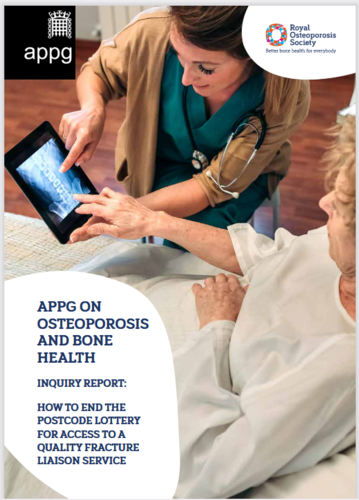 The All Party Parliamentary Group (APPG) for Osteoporosis and Bone Health published a report into the long-standing postcode lottery in the NHS for osteoporosis care. The report highlights the scale of under-diagnosis, under-treatment and missed opportunities in the NHS, with a blueprint for change. Implementation of the blueprint in England and Wales could save the NHS around £287m over five years – a return on investment of around 3:1 – according to the Royal Osteoporosis Society (ROS), which has supported the Inquiry. The report highlights the deep inequalities for access to a Fracture Liaison Service (FLS) – the world standard for diagnosing and treating osteoporosis. Pioneered in Britain, the FLS model systematically identifies, assesses and treats anyone who sustains a fracture (broken bone) after the age of 50. Key data collected by the APPG Inquiry shows that:
The All Party Parliamentary Group (APPG) for Osteoporosis and Bone Health published a report into the long-standing postcode lottery in the NHS for osteoporosis care. The report highlights the scale of under-diagnosis, under-treatment and missed opportunities in the NHS, with a blueprint for change. Implementation of the blueprint in England and Wales could save the NHS around £287m over five years – a return on investment of around 3:1 – according to the Royal Osteoporosis Society (ROS), which has supported the Inquiry. The report highlights the deep inequalities for access to a Fracture Liaison Service (FLS) – the world standard for diagnosing and treating osteoporosis. Pioneered in Britain, the FLS model systematically identifies, assesses and treats anyone who sustains a fracture (broken bone) after the age of 50. Key data collected by the APPG Inquiry shows that:
- Only half of Trusts in England provide an FLS, compared to 100% coverage in Scotland and Northern Ireland.
- 28% of Trusts tried to set up an FLS, but found the main barrier to be funding
- Only 15% (19/123) of Trusts in England met the national quality benchmark for identifying at least 80% of patients who need treatment
- Only 8% of Trusts (9/123) in England met the national quality standard for following-up patients on drug treatment 52 weeks after their fracture
A stark example of the missed opportunities for prevention is that 2.2m people in the UK are living with undiagnosed spinal fractures. This leaves them at heightened risk of suffering a hip fracture, the injury that does more than any to undermine people’s quality of life and independence, with a 25% mortality rate over 12 months. The Inquiry heard new evidence that around 70% of spinal fractures never come to medical attention due, in part, to the postcode lottery for FLS.
The Inquiry also heard evidence from the Royal Osteoporosis Society (ROS) on the impact this has on people living with the condition:
- Around a third of osteoporosis patients (29%) had to prompt their own health assessment, suggesting tens of thousands of less-aware people are being left at risk
- Almost half of people (46%) were dissatisfied with the level of monitoring they were receiving from the NHS.
- Only half (54%) of people feel confident about managing their osteoporosis
This data was presented to the PM’s health advisers at Number 10 in November, on behalf of the Inquiry.
Craig Jones, CEO of the Royal Osteoporosis Society said:
“Tackling osteoporosis is the key to making sure our ageing society can live well. Without action, a longer life won’t be a better life. Without change and investment, the NHS and social care system face an impossible level of demand. If we get this right, and end the postcode lottery around osteoporosis, we can transform the experience of later life in this country, while protecting our NHS.”
The Inquiry reported has been supported by: Bone Research Society, British Geriatrics Society, British Orthopaedic Association, British Society of Skeletal Radiologists, Chartered Society of Physiotherapy, International Osteoporosis Foundation, and Primary Care Rheumatology and Musculoskeletal Medicine Society.
Read the APPG report or find out more about the APPG Inquiry from the Royal Osteoporosis Society website.
